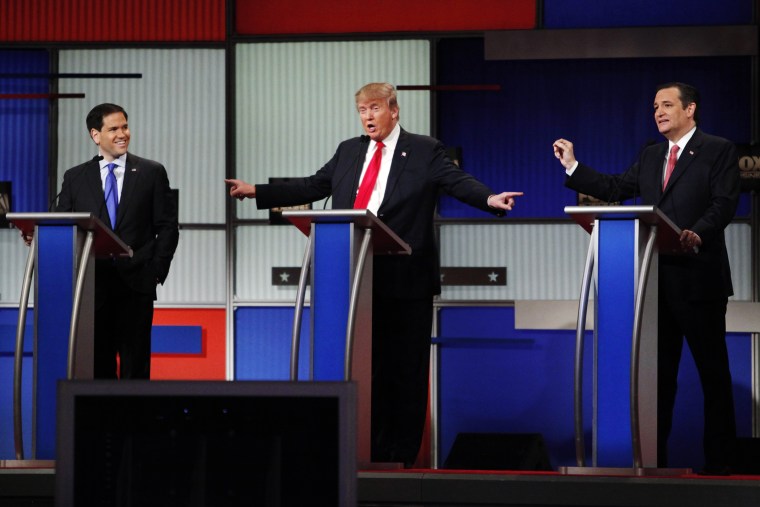As campaign tactics go, targeting Donald Trump over his tax returns looked like a no-brainer. The Republican frontrunner has kept his materials private for reasons he hasn't explained, and when he came up with an excuse -- Trump claims the IRS is auditing him -- it was quickly discredited.
Mitt Romney even piqued the media's interest with unsubstantiated allegations of a "bombshell" lurking in Trump's undisclosed returns.
With this in mind, a move like
this one made perfect sense -- at least at first.
Marco Rubio and Ted Cruz on Saturday released summaries of the of their tax returns, in an effort to shame front-runner Donald Trump into releasing more of his financial documents. Rubio released summaries of five tax years Saturday and Cruz later released summaries of four years, from 2011 to 2014.
Wait, "summaries"? Rubio and Cruz want Trump to release his tax returns, as all modern nominees have done, but they're only prepared to make "summaries" available?
As it turns out, yes. In fact, the Washington Post
reported that both Republican senators released "only the first two pages of returns for the years 2010 to 2014, which provide summary information." The article added, "Without the full returns, key details about Cruz's and Rubio's family financial dealings -- such as precise sources of income, deductions and amounts donated to charity -- were not revealed."
Asked late Saturday about the limits of his disclosures, Cruz
said he was merely following Rubio's lead -- and while Cruz has made charitable contributions, his campaign "isn't going to release any more tax information at the moment."
To borrow a Casey Stengel line, can't anyone here play this game?
Hitting Trump over his tax returns is a good move. Pressuring Trump to release his materials by releasing your own tax returns is also a good move.
But the surest way to make a story disappear quickly is to fail to follow through. In this case, Rubio and Cruz weren't willing to do what they were calling on Trump to do, which doesn't work. What the campaigns wanted were reports that said, "Rubio and Cruz released their tax returns and urged Trump to do the same," not, "Rubio and Cruz want Trump to release their tax returns, but they haven't yet done so themselves."
"The gross numbers without the schedules don't tell you anything," said Martin Schenkman, a tax lawyer and certified public accountant in Fort Lee, New Jersey. Rubio's campaign didn't respond immediately to a request for comment. The records -- which amount to the first two pages of each annual tax filing the Rubios made from 2010 through 2014 -- show that they paid federal income taxes at the rate of about 23 percent. Coupled with prior returns from 2000 through 2009, which Rubio released when he ran for the U.S. Senate in Florida, the documents raise questions, Schenkman said. "He's attacking Trump on the same disclosure issues, but his own disclosures are obfuscatory," Shenkman said.
It's like watching a losing team miss layups.
